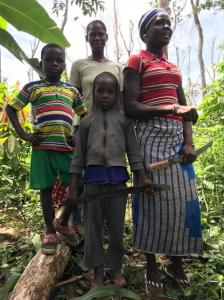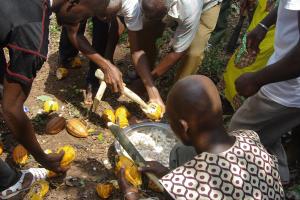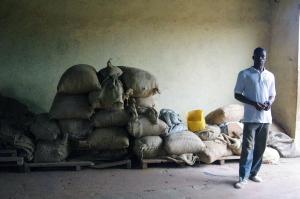
A way To Go in the Chocolate Industry to Address Environmental Issues and Child Labour affected by Pesticide Exposure
Survey reveals good chocolate producers and laggers Charities call to stop poisoning children 29 organisations collaborate to help the public buy responsibly
• Charities call on a group of companies dominating global cocoa production to “stop poisoning children”
• 29 organisations collaborate on Chocolate Scorecard to help the public buy responsibly
How ethical is your chocolate? With the Easter egg season upon us, researchers have rated the social and environmental impact of the companies that control global cocoa production.
The annual Chocolate Scorecard study, surveyed 38 of the world’s largest chocolate companies, including chocolate traders, processors and manufacturers. www.chocolatescorecard.com
These account for 80-90% of global chocolate products, Easter eggs among them, and include giants such as Mars, Lindt, Nestlé, Mondelez (Cadbury), Ferrero and Hershey’s.
Ranking highly in ethical terms were US-based Alter Eco, Beyond Good, New Zealand based Whittaker’s and Tony’s Chocolonely from the Netherlands.
Only three businesses – Starbucks, General Mills and Storck, manufacturer of Werther’s Original – chose not to take part in the study, eschewing transparency and opting instead to conceal their practices.
The 38 companies were rated on the six most pressing sustainability issues facing the chocolate industry: traceability and transparency; living income policies; child labour; deforestation and climate; agroforestry; and agrichemical management.
CHILD LABOUR
While there had been improvements in many areas since last year’s survey, the researchers said there was still a long way to go in addressing the issue of approximately 1.56 million children caught up in child labour. This is in spite of repeated calls to address the issue and following a major academic study in 2020 revealing the scope of the problem.
Just this week footage emerged of children working with machetes on a cocoa farm that supplies Mondelez, owner of Cadbury.
“We are not at all surprised that a journalist found child labourers on farms allegedly supplying to Mondelez. Our concern is that we are not finding more of these children,” says Fuzz Kitto of Be Slavery Free, the Australia-based charity which coordinated the Chocolate Scorecard.
“Much of the child labour found in West Africa is the hazardous form of child labour, where a child is in danger through such things as carrying heavy loads, using dangerous equipment or being exposed to chemicals,” says Fuzz Kitto of Be Slavery Free, the Australia-based charity which coordinated The Chocolate Scorecard.
“Every year the chocolate industry’s big players assure us that they’ll do something about child labour and the huge numbers of children being exposed to chemicals that burn their skin and affect their breathing. We say that progress is too slow and they have to stop poisoning children to produce chocolate.”
“If companies started paying farmers properly, so they can get a living income, there would be fewer children forced to work in cocoa production and fewer farmers cutting corners with dangerous pesticides.”
The Chocolate Scorecard focuses on the production and supply chains that start in West Africa, where around 75% of the world’s cocoa is produced.
“We’re often asked what chocolate is the most ethical to eat, so we always set out to name and fame rather than just name and shame. That way consumers get to see what better looks like,” says Fuzz Kitto.
GOOD EGGS AND ROTTEN EGGS
This year Ferrero joins the list of companies, including Hershey’s, Unilever and Ritter, whose cocoa is close to 100% certified by the Rainforest Alliance or Fairtrade.
“While certification is not perfect,” says Fuzz Kitto, “it is often a positive first step in a company’s sustainability journey.”
Storck, Starbucks and General Mills were awarded the researchers’ “broken egg” for their continuing refusal to cooperate with The Chocolate Scorecard. Storck was given the worst rating overall and awarded this year’s rotten egg for a lack of transparency about its policies and practices in their cocoa supply chain, and in light of civil society complaints about the company.
“If they are making progress on increasing the sustainability of their chocolate supply chains then we and their customers and investors would like to hear about it.” says Kitto.
A positive the researchers found this year is the massive increase in commitment to cocoa production as part of an agroforestry system, whereby cocoa and other trees are grown together. This system has many benefits, maintaining cocoa yields while helping farmers diversify – and restoring and improving local biodiversity at the same time.
Nestlé is notable for not only their 2021 distribution of over 1 million shade trees and a pledge for another million shade trees in 2022 in Côte d’Ivoire and Ghana but also a reforestation program to plant 20 million trees every year for the next 10 years in the area where it sources ingredients.
The annual survey and its dissemination is a collaboration between 29 organisations from around the world, including Australia’s Macqaurie University and University of Wollongong, and the Open University (UK) as research partners, and not-for-profit groups.
Says Andrew Wallis OBE, CEO of Unseen: “When faced with the issues surrounding child labour, individuals often feel overwhelmed by the problem and ask, ‘What can I realistically do?’ The Chocolate Scorecard is a brilliant way to help consumers choose wisely and eat chocolate this Easter with a clearer conscience.”
NOTES TO EDITORS
For all press enquiries, pictures and expert quotes, contact
• Australia Fuzz Kitto (Australian Eastern Time) +61 (0) 407 931 115 fuzz.kitto@beslaveryfree.com (English)
• United Kingdom Dominic Murphy (UK Time) +44 (0)7943 498239 d.murphy@unseenuk.org (English)
• Europe Esta Steyn (Central European Time) +31 6 3457 1595 esta.steyn@beslaveryfree.com (Dutch, Afrikaans)
• United States Etelle Higonnet (USA Eastern time), +1 202 848 7792. Etelle.Higonnet@gmail.com (English, French, Spanish, Portuguese, Italian, German)
• Japan Roger Smith (USA Eastern Time), roger@mightyearth.org (Japanese)
About the survey: https://chocolatescorecard.com/methodology
THE CHOCOLATE COLLECTIVE:
Researcher Team Be Slavery Free, Macquarie University (Australia), Wollongong University (Australia) The Open University (UK)
Subject Matter Consultants, Forest Trends, International Cocoa Initiative, Pesticide Action Network, Sudwind Institute,
VOICE Network
Partners Abolishion, ACRATH, Asset Campaign, Baptist World Aid Australia, Child Labor Coalition, EcoCare Ghana, Estwatch, European Freedom Network, Freedom United, Green America, JATAN, El Llamado del Bosque, Mighty
Fuzz Kitto
Be Slavery Free
+61 407 931 115
email us here
Visit us on social media:
Facebook
Twitter
LinkedIn
Distribution channels: Agriculture, Farming & Forestry Industry, Consumer Goods, Human Rights, Retail, World & Regional
Legal Disclaimer:
EIN Presswire provides this news content "as is" without warranty of any kind. We do not accept any responsibility or liability for the accuracy, content, images, videos, licenses, completeness, legality, or reliability of the information contained in this article. If you have any complaints or copyright issues related to this article, kindly contact the author above.
Submit your press release


